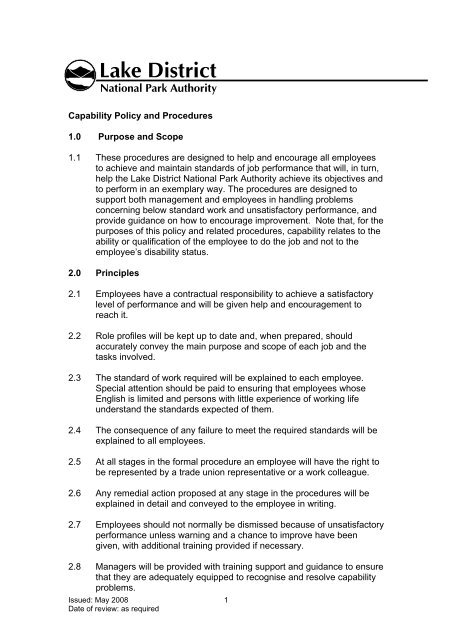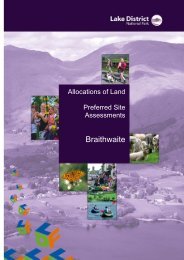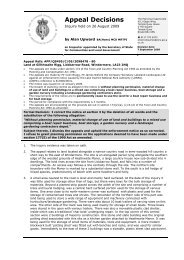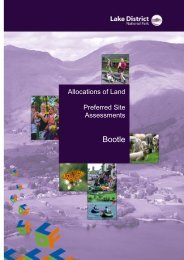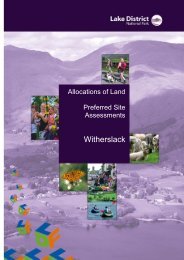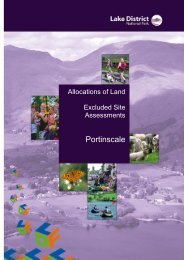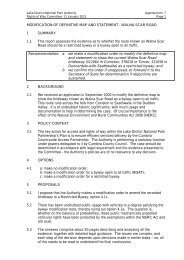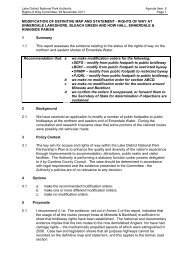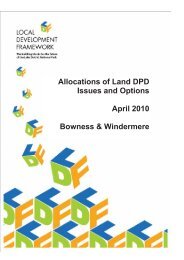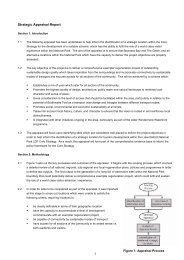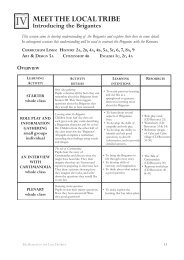Report on HR Policies Annex 1 Capability Policy (PDF)
Report on HR Policies Annex 1 Capability Policy (PDF)
Report on HR Policies Annex 1 Capability Policy (PDF)
You also want an ePaper? Increase the reach of your titles
YUMPU automatically turns print PDFs into web optimized ePapers that Google loves.
<strong>Capability</strong> <strong>Policy</strong> and Procedures<br />
1.0 Purpose and Scope<br />
1.1 These procedures are designed to help and encourage all employees<br />
to achieve and maintain standards of job performance that will, in turn,<br />
help the Lake District Nati<strong>on</strong>al Park Authority achieve its objectives and<br />
to perform in an exemplary way. The procedures are designed to<br />
support both management and employees in handling problems<br />
c<strong>on</strong>cerning below standard work and unsatisfactory performance, and<br />
provide guidance <strong>on</strong> how to encourage improvement. Note that, for the<br />
purposes of this policy and related procedures, capability relates to the<br />
ability or qualificati<strong>on</strong> of the employee to do the job and not to the<br />
employee’s disability status.<br />
2.0 Principles<br />
2.1 Employees have a c<strong>on</strong>tractual resp<strong>on</strong>sibility to achieve a satisfactory<br />
level of performance and will be given help and encouragement to<br />
reach it.<br />
2.2 Role profiles will be kept up to date and, when prepared, should<br />
accurately c<strong>on</strong>vey the main purpose and scope of each job and the<br />
tasks involved.<br />
2.3 The standard of work required will be explained to each employee.<br />
Special attenti<strong>on</strong> should be paid to ensuring that employees whose<br />
English is limited and pers<strong>on</strong>s with little experience of working life<br />
understand the standards expected of them.<br />
2.4 The c<strong>on</strong>sequence of any failure to meet the required standards will be<br />
explained to all employees.<br />
2.5 At all stages in the formal procedure an employee will have the right to<br />
be represented by a trade uni<strong>on</strong> representative or a work colleague.<br />
2.6 Any remedial acti<strong>on</strong> proposed at any stage in the procedures will be<br />
explained in detail and c<strong>on</strong>veyed to the employee in writing.<br />
2.7 Employees should not normally be dismissed because of unsatisfactory<br />
performance unless warning and a chance to improve have been<br />
given, with additi<strong>on</strong>al training provided if necessary.<br />
2.8 Managers will be provided with training support and guidance to ensure<br />
that they are adequately equipped to recognise and resolve capability<br />
problems.<br />
Issued: May 2008<br />
Date of review: as required<br />
1
2.9 Assessment criteria used in the review of job performance and in the<br />
applicati<strong>on</strong> of these procedures must be n<strong>on</strong>-discriminatory and<br />
relevant to the job. They should be applied irrespective of racial group,<br />
age, sex, marital status, disability, sexual orientati<strong>on</strong> or religi<strong>on</strong> or<br />
belief.<br />
2.10 The policy and procedures do not apply to new employees during their<br />
probati<strong>on</strong>ary period, during which time performance will be m<strong>on</strong>itored<br />
and reviewed using regular performance management arrangements.<br />
2.11 It could be anticipated that minor improvements should be managed<br />
within a period of <strong>on</strong>e m<strong>on</strong>th whilst major improvements in performance<br />
may take l<strong>on</strong>ger, and that up to a three m<strong>on</strong>th period may be required.<br />
3.0 <strong>Capability</strong> Procedures – unsatisfactory standard of work<br />
3.1 A flowchart outlining the processes and stages is attached as Appendix<br />
4.0 Informal Stage<br />
4.1 Where an employee’s capability is in questi<strong>on</strong>, the line manager should<br />
arrange to meet with the employee to ascertain the root of the problem.<br />
Regular discussi<strong>on</strong> with employees about performance, either formally<br />
or informally, will help to identify any problem areas and allow remedial<br />
acti<strong>on</strong> to be taken promptly. Guidelines in Chart 1 of Appendix 1 set out<br />
the procedures to be followed at the informal stage.<br />
4.2 Under performance, particularly during a probati<strong>on</strong> period, should be<br />
identified as quickly as possible, so that appropriate remedial acti<strong>on</strong><br />
can be taken in a timescale that balances the needs of management to<br />
have the work performed to the required standard, the time taken to<br />
achieve a satisfactory level of performance and the length of the<br />
probati<strong>on</strong>ary period.<br />
4.3 The employee should be reminded of the standards required and<br />
asked for an explanati<strong>on</strong> and given the opportunity to identify any areas<br />
of c<strong>on</strong>cern in relati<strong>on</strong> to training, support, instructi<strong>on</strong>s and the duties<br />
and resp<strong>on</strong>sibilities undertaken.<br />
4.4 Where the reas<strong>on</strong> for under performance is the lack of required skills,<br />
the employee should, wherever practicable, be assisted through<br />
training and instructi<strong>on</strong>, and/or any other reas<strong>on</strong>able support necessary<br />
to enable them to undertake the work to the required standard.<br />
Supervisi<strong>on</strong> and guidance will be provided as well as a reas<strong>on</strong>able<br />
timescale in which to improve and reach the required standard. A note<br />
should be issued that c<strong>on</strong>firms the required standards and a date for a<br />
future review.<br />
Issued: May 2008<br />
Date of review: as required<br />
2
5.0 Formal Stage<br />
5.1 A number of opti<strong>on</strong>s may be c<strong>on</strong>sidered to address the issues.<br />
Improvement Note<br />
5.2 Should there be insufficient improvement at the end of the prescribed<br />
period (or before if performance c<strong>on</strong>tinues to go down during the<br />
period), and despite encouragement and <strong>on</strong>going assistance the<br />
employee’s performance is still below requirements, the employee will<br />
be formally interviewed by the line manager. At this and each stage of<br />
the formal procedures a Trade Uni<strong>on</strong> or work representative may<br />
accompany the employee.<br />
5.3 If the line manager is dissatisfied with the rate of improvement, then an<br />
improvement note may be issued. This is the first stage of a formal<br />
procedure and the employee will be advised that failure to improve<br />
could lead to a final written warning and, ultimately, dismissal. Details<br />
of the process to be followed are included as Chart 2 of Appendix 1.<br />
5.4 The improvement note will provide details of the performance problem;<br />
the improvement that is required; the timescale for achieving this<br />
improvement; a review date; and, any support the line manager will<br />
provide to assist the employee. A copy of the note should be kept and<br />
used as the basis for m<strong>on</strong>itoring and reviewing performance over a<br />
specified period.<br />
5.5 During the review period, an interim review stage should be included in<br />
order to assess progress. If there has been some improvement during<br />
this period, however, additi<strong>on</strong>al effort is still required to bring<br />
performance up to the required standard, this should be acknowledged.<br />
The outstanding issues should be detailed in writing and an additi<strong>on</strong>al<br />
review period agreed.<br />
Redeployment Register<br />
5.6 If after the prescribed period there is insufficient or no improvement<br />
following the issue of the improvement note and the interim review, the<br />
employee will be invited to a further meeting with a senior manager and<br />
if there is clear evidence that the employee is unable to meet the<br />
required standards, c<strong>on</strong>siderati<strong>on</strong> should be given to placing the<br />
employee <strong>on</strong> the Redeployment Register in order to find them suitable<br />
alternative work. This may be, if necessary, <strong>on</strong> a different grade or in<br />
another Directorate. Such an arrangement will <strong>on</strong>ly be made by mutual<br />
c<strong>on</strong>sent with the employee and the Directorate where the vacancy has<br />
arisen.<br />
5.7 If a suitable alternative post is available and in discussi<strong>on</strong> with the<br />
prospective line manager, an offer of employment will be made in<br />
writing. An employee’s details will normally be retained <strong>on</strong> the<br />
Redeployment Register for a maximum period of three m<strong>on</strong>ths.<br />
Issued: May 2008<br />
Date of review: as required<br />
3
5.8 If an employee is successful in gaining an alternative post through<br />
these arrangements, the salary for the post will apply.<br />
Final Written Warning<br />
5.9 If no suitable alternative post is available, or the employee<br />
unreas<strong>on</strong>ably refuses such an offer a final written warning will be<br />
issued. This warning should indicate clearly that dismissal might follow<br />
if, within a reas<strong>on</strong>able period of time, they have still not achieved the<br />
necessary standard of performance.<br />
Dismissal<br />
5.10 If after the prescribed period, and following these warnings, the<br />
employee is still unable to achieve a satisfactory level of performance<br />
even after an opportunity to improve, and with training assistance, and<br />
alternative work has not provided an alternative soluti<strong>on</strong>, then the<br />
situati<strong>on</strong> should be explained to the employee sympathetically before<br />
dismissal acti<strong>on</strong> is taken. Such interviews should <strong>on</strong>ly take place after<br />
c<strong>on</strong>sultati<strong>on</strong> with and in the presence of a senior <strong>HR</strong> representative.<br />
5.11 This acti<strong>on</strong> will be c<strong>on</strong>firmed in writing, detailing the reas<strong>on</strong>s why this<br />
course of acti<strong>on</strong> has been taken. The letter will state the grounds for<br />
the acti<strong>on</strong> taken and c<strong>on</strong>firm the employee’s right of appeal al<strong>on</strong>g with<br />
details of how this can be d<strong>on</strong>e. Chart 3 of Appendix 1 outlines these<br />
final stages of the formal procedures.<br />
Redundancy<br />
5.12 If the main cause of the unsatisfactory performance is the changing<br />
nature of the job, advice should be sought from a senior <strong>HR</strong><br />
representative as to whether the situati<strong>on</strong> may properly be treated as<br />
redundancy rather than as a capability or disciplinary situati<strong>on</strong>.<br />
Negligence<br />
5.13 Negligence usually involves a measure of pers<strong>on</strong>al blame or failure in<br />
accountability arising, for example, from lack of motivati<strong>on</strong> or<br />
inattenti<strong>on</strong>. Examples could include failure to comply with health and<br />
safely regulati<strong>on</strong>s. Some form of disciplinary acti<strong>on</strong> will normally be<br />
appropriate in these circumstances. Where acti<strong>on</strong> is required to be<br />
taken to show the Authority’s disapproval of the behaviours displayed,<br />
recourse should be made through the applicati<strong>on</strong> of the disciplinary<br />
policy and procedures<br />
Lack of Ability<br />
5.14 Lack of ability is due to lack of skill, experience or knowledge, and may<br />
point to poor recruitment procedures or inadequate training. Where<br />
skills have become outmoded by new technology, employers should<br />
Issued: May 2008<br />
Date of review: as required<br />
4
c<strong>on</strong>sider whether new skills could be achieved through training. Only in<br />
the event of the failure of the employee to achieve the standard<br />
required should c<strong>on</strong>siderati<strong>on</strong> be given to the applicati<strong>on</strong> of the<br />
capability or disciplinary procedures.<br />
6.0 Appeals<br />
6.1 Where formal ‘warnings’ have been given employees will have<br />
recourse to the Appeals procedures outlined at secti<strong>on</strong> 3.2.9 of the<br />
LDNPA Disciplinary <strong>Policy</strong> and Procedures.<br />
7.0 Records<br />
7.1 All records should be kept in line with the Data Protecti<strong>on</strong> Act 1998.<br />
This will include minutes of meetings, emails, attendance notes, notes<br />
of teleph<strong>on</strong>e calls, copies of corresp<strong>on</strong>dence etc. Records will be<br />
treated as c<strong>on</strong>fidential. Copies of meeting records will be given to the<br />
employee although in certain circumstances (for example to protect a<br />
witness) some informati<strong>on</strong> may be withheld. Copies of spent warnings<br />
will be removed from the employees’ file, although details will be<br />
retained centrally within Human Resources.<br />
8.0 Roles and Resp<strong>on</strong>sibilities<br />
8.1 Informati<strong>on</strong> <strong>on</strong> the roles and resp<strong>on</strong>sibilities, as well as legislati<strong>on</strong> that<br />
impacts <strong>on</strong> these procedures is c<strong>on</strong>tained within Appendix 2 to this<br />
document.<br />
8.2 A scheme of delegati<strong>on</strong> which identifies who can take acti<strong>on</strong> is<br />
attached as Appendix 3.<br />
Issued: May 2008<br />
Date of review: as required<br />
5
Appendix 2<br />
<strong>Capability</strong> <strong>Policy</strong> and Procedure<br />
Roles and Resp<strong>on</strong>sibilities<br />
To whom do the policy and procedures apply?<br />
• All employees, irrespective of their length of service, status or number of<br />
hours worked, with the excepti<strong>on</strong> of new employees <strong>on</strong> a fixed<br />
probati<strong>on</strong>ary period.<br />
What are the policy and procedures about?<br />
• Helping and encouraging all employees to achieve and maintain standards<br />
of c<strong>on</strong>duct, attendance and job performance<br />
• Assisting the organisati<strong>on</strong> to operate effectively.<br />
• Ensuring c<strong>on</strong>sistent and fair treatment for all within the standards and rules<br />
set by the Authority.<br />
What are the Authority’s resp<strong>on</strong>sibilities?<br />
The Authority has resp<strong>on</strong>sibilities to ensure that:<br />
• All employees are aware of the standards and rules that apply<br />
• Performance management procedures are carried out regularly and<br />
routinely to underpin the capability procedures<br />
• Managers know and explore the opti<strong>on</strong>s open to them before c<strong>on</strong>sidering<br />
applying capability and/or disciplinary procedures<br />
• Statutory procedures are applied in appropriate circumstances<br />
• Internal procedures are complied with<br />
• Employees are treated fairly and c<strong>on</strong>sistently<br />
• Proper investigati<strong>on</strong>s are carried out before acti<strong>on</strong> is c<strong>on</strong>sidered<br />
• Decisi<strong>on</strong>s made are reas<strong>on</strong>able<br />
• Those involved in disciplinary procedures are appropriately trained<br />
What are the managers’ resp<strong>on</strong>sibilities?<br />
Managers have resp<strong>on</strong>sibilities to:<br />
• Familiarise themselves with these procedures and ensure that they<br />
understand their role before taking acti<strong>on</strong> within them<br />
• Ensure that role profiles are kept up to date and, when prepared, should<br />
accurately c<strong>on</strong>vey the main purpose and scope of each job and the tasks<br />
involved<br />
• Explain to each employee the standard of work that is required<br />
• Explain to each employee the c<strong>on</strong>sequence of any failure to meet the<br />
required standards<br />
• Explain any remedial acti<strong>on</strong> required and c<strong>on</strong>firm this in writing<br />
• Ensure that assessment criteria used in the review of job performance and<br />
the applicati<strong>on</strong> of these procedures are n<strong>on</strong>-discriminatory and relevant to<br />
Issued: May 2008<br />
Date of review: as required
the job and apply these irrespective of racial group, age, sex, marital<br />
status, disability, sexual orientati<strong>on</strong> or religi<strong>on</strong> or belief.<br />
What are the employees’ resp<strong>on</strong>sibilities?<br />
Employees have a duty to:<br />
• Make themselves aware of the rules and policies that apply within the<br />
Authority and to comply with these<br />
• Take part in the Authority’s performance management processes as an<br />
enabler of performance<br />
• Participate in training activities that will support their performance<br />
• Make themselves aware of the standards that are expected of them and to<br />
work diligently in their applicati<strong>on</strong>.<br />
• Cooperate with the employer as far as is necessary to enable the<br />
employer to comply with the requirements of legislati<strong>on</strong>.<br />
What are Human Resources’ resp<strong>on</strong>sibilities?<br />
Human Resources are available to:<br />
• Advise <strong>on</strong> procedures<br />
• Encourage management to act in a fair and c<strong>on</strong>sistent manner<br />
• Provide access to training <strong>on</strong> best practice and legislati<strong>on</strong> that impacts <strong>on</strong><br />
employment<br />
What will happen if the policy is not followed?<br />
Should the Authority fail to address capability issues and to comply with the<br />
policy, this could result in inefficiencies in delivering the service that it is<br />
charged to promote. The Authority could also be vulnerable to claims through<br />
Employment Tribunals and damage to its reputati<strong>on</strong> as an exemplar<br />
employer.<br />
Key legislati<strong>on</strong><br />
Most of the provisi<strong>on</strong>s governing capability and discipline at work are currently<br />
to be found in the Employment Act 2002 and the detailed regulati<strong>on</strong>s made to<br />
implement the provisi<strong>on</strong>s of that Act namely the Employment Act 2002<br />
(Dispute Resoluti<strong>on</strong>) Regulati<strong>on</strong>s 2004.<br />
Other pieces of legislati<strong>on</strong> cross-refer to capability and discipline. These<br />
include:<br />
• Employment Rights Act 1996 as amended<br />
• Employment Rights Dispute Resoluti<strong>on</strong> Act 1998<br />
• Employment Relati<strong>on</strong>s Act 1999<br />
• Employment Rights Act 2004<br />
• Human Rights Act 1998<br />
• Data Protecti<strong>on</strong> Act 1998<br />
• Disability Discriminati<strong>on</strong> Act 1995<br />
The Authority procedures will be reviewed regularly in line with any<br />
subsequent changes to the legislati<strong>on</strong> and in the light of best practice.<br />
Issued: May 2008<br />
Date of review: as required
Other relevant policies<br />
This policy should be used, in particular, in c<strong>on</strong>juncti<strong>on</strong> with the Authority’s<br />
policies <strong>on</strong>:<br />
• Discipline<br />
• Performance Management<br />
• Training and Development<br />
• Absence<br />
• Alcohol and substance misuse<br />
• Dignity at Work<br />
• Equality and Diversity<br />
• Health and Safety<br />
Some of these policies are currently being drafted or reviewed. Advice should<br />
be sought from a senior <strong>HR</strong> Representative, if feasible before taking acti<strong>on</strong> to<br />
implement the procedures.<br />
Useful websites<br />
www.acas.org.uk<br />
www.dataprotecti<strong>on</strong>.gov.uk<br />
<strong>Policy</strong> owners<br />
• Chief Executive<br />
• Head of Human Resources<br />
Alternative formats<br />
Alternative formats for policies and toolkits are available from the Human<br />
Resources and Learning and Development Assistant <strong>on</strong> 01539 792703.<br />
Issued: May 2008<br />
Date of review: as required
<strong>Capability</strong> Scheme of Delegati<strong>on</strong> of Authority<br />
Appendix 3<br />
Level of warning<br />
Seniority<br />
level<br />
within<br />
Authority<br />
the<br />
First stage<br />
warning<br />
Formal Stage<br />
including<br />
Improvement<br />
Note /<br />
applicati<strong>on</strong> to<br />
join the<br />
Redeployment<br />
Register/Final<br />
Written<br />
Warning<br />
Dismissal<br />
or other<br />
sancti<strong>on</strong><br />
Appeal<br />
All staff below<br />
Head of<br />
Service level<br />
Line<br />
Manager*<br />
Head<br />
Service<br />
of<br />
Director<br />
Director from<br />
other<br />
Service<br />
Department<br />
Head<br />
Service<br />
of<br />
Director Director Director Other<br />
Service<br />
Department<br />
Director or<br />
Chief<br />
Executive<br />
Director<br />
& Statutory<br />
Officers<br />
(excluding<br />
Chief<br />
Executive)<br />
Chief<br />
Executive<br />
Chief<br />
Executive<br />
Committee<br />
of<br />
3<br />
members**<br />
Chief Executive<br />
Committee of<br />
3<br />
members**<br />
Chief<br />
Executive<br />
Authority **<br />
Committee<br />
of<br />
3 members<br />
Committee<br />
of<br />
3 members<br />
not<br />
previously<br />
involved and<br />
including the<br />
Chair*<br />
Notes<br />
*Should it become apparent that the nature of the complaint is very serious<br />
then any hearing may be suspended and a decisi<strong>on</strong> made regarding how the<br />
matter is taken forward.<br />
** Full cognisance will be taken of the procedures set out within the Joint<br />
Negotiating Committee for Chief Executives of Local Authorities.<br />
Issued: May 2008<br />
Date of review: as required


